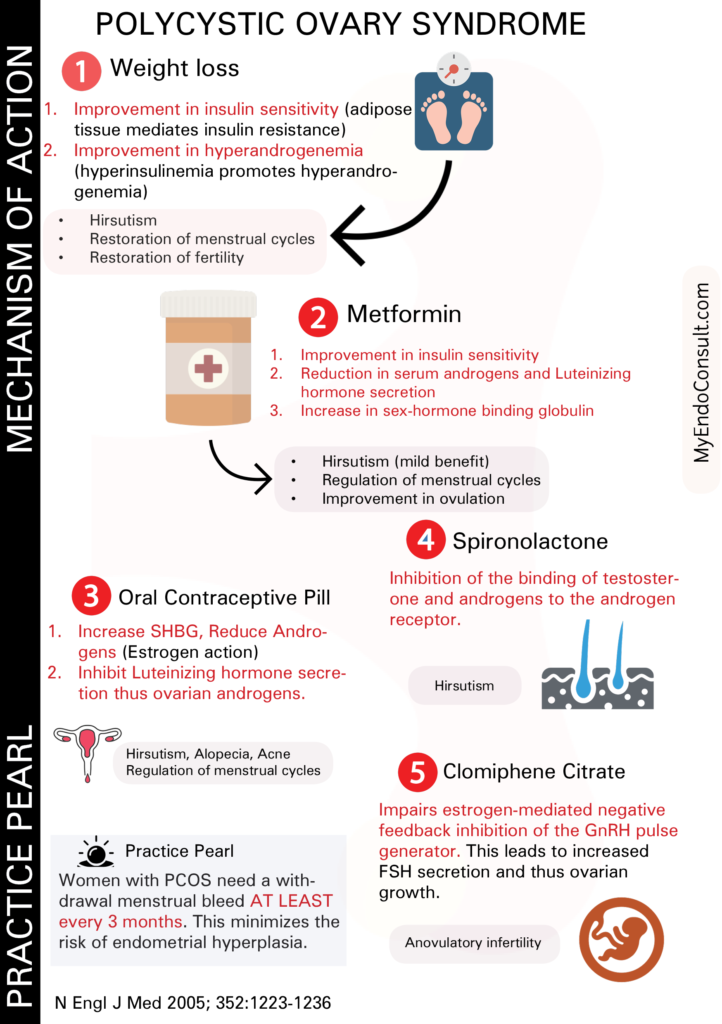The mechanism of action of various treatments in polycystic ovary syndrome is summarized in this infographic. Treatments including weight loss, oral contraceptive pills, spironolactone, metformin, letrozole and clomiphene citrate.
Introduction
Polycystic ovary syndrome (PCOS) is a hormonal disorder that affects women of childbearing age. The most common symptoms of PCOS are oligomenorrhea (infrequent or irregular periods) and polycystic ovaries (enlarged ovaries with small cysts on the surface). Other symptoms can include hirsutism (excessive hair growth), acne, and weight gain. PCOS often goes undiagnosed because many of its symptoms are considered normal during puberty or pregnancy. However, if left untreated, PCOS can lead to serious health problems such as infertility, type 2 diabetes, and endometrial cancer.
1. Weight Loss
The condition is characterized by insulin resistance, which can lead to weight gain (adipose tissue accumulation). PCOS can also cause fertility problems and irregular menstrual cycles. While there is no cure for PCOS, weight loss can help to improve the symptoms of the condition. By reducing insulin resistance, weight loss can help to restore fertility and regulate menstrual cycles. In addition, weight loss can help to reduce the risk of other health problems associated with PCOS, such as type 2 diabetes, non-alcoholic fatty liver disease, and cardiovascular disease. For these reasons, weight loss is an important part of managing PCOS.
2. Metformin
While the exact cause of PCOS is unknown, it is believed to be associated with insulin resistance. Metformin works by improving insulin sensitivity and lowering insulin levels. This can help to regulate menstrual cycles and improve fertility. In addition, metformin may also help to reduce hirsutism (excess hair growth) and improve ovulation rates. Overall, metformin is a safe and effective treatment for PCOS that can improve fertility and quality of life.
3. Oral Contraceptive Pills
Oral contraceptives can help to regulate hormone levels, reducing hirsutism and other symptoms. They work by essentially “tricking” the body into thinking that ovulation has already occurred. This prevents the release of eggs from the ovaries, and it also decreases the production of androgens. In turn, this can help to reduce hirsutism and improve menstrual regularity.
Additionally, oral contraceptives can also help to prevent endometrial hyperplasia, a condition that can occur when the lining of the uterus becomes too thick. By preventing ovulation, oral contraceptives can help to thin the endometrium and reduce the risk of hyperplasia.
4. Spironolactone
The mechanism of action of spironolactone in PCOS is not fully understood, but it is thought to work by blocking androgen receptors. Blocking androgen receptors helps to reduce hirsutism and acne by preventing androgens from binding to these receptors in the skin.
5. Clomiphene Citrate
Clomiphene citrate works by blocking estrogen receptors in the brain. This in simple terms, tricks the body into thinking that estrogen levels are low, which stimulates the release of gonadotropin-releasing hormone (GnRH).
Subsequently, GnRH signals the pituitary gland to release more follicle-stimulating hormone (FSH) and luteinizing hormone (LH). FSH and LH stimulate the ovaries to produce eggs, and this eventually leads to ovulation.
Clomiphene citrate is usually taken for 5 days, starting on day 3, 4, or 5 of the menstrual cycle. Ovulation usually occurs 5-10 days after taking the last dose of clomiphene citrate.
Infographic of treatments in PCOS

References
- Rocha AL, Oliveira FR, Azevedo RC, et al. Recent advances in the understanding and management of polycystic ovary syndrome. F1000Res. 2019;8:F1000 Faculty Rev-565. Published 2019 Apr 26.
- Jin P, Xie Y. Treatment strategies for women with polycystic ovary syndrome. Gynecol Endocrinol. 2018 Apr;34(4):272-277.
Kindly Let Us Know If This Was helpful? Thank You!


